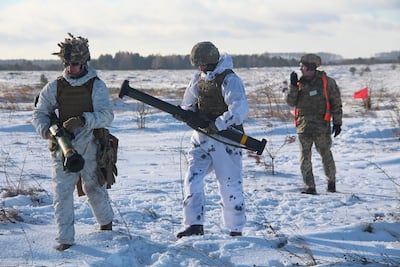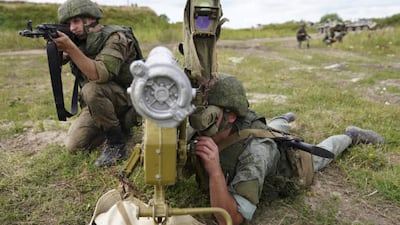The US and Nato are willing to make concessions to Russia by keeping missiles out of Ukraine and being more open about their military drills, according to leaked diplomatic texts.
The two documents published by Spanish newspaper El Pais reveal the formal response by America and its allies to Russia’s demands for two new security treaties in Europe.
They reject the Kremlin’s central demand to veto any further eastward expansion of Nato, and say that Russia must pull back its troops from the Ukrainian border for any meaningful progress to be made.
But they suggest potential areas of agreement, such as refraining from stationing troops or missile launchers in Ukraine, limiting intermediate and short-range missiles and lowering the threshold at which the US and Nato would be required to alert Moscow to drills.
US diplomats said they were “ready to consider arrangements or agreements with Russia … to include written, signed instruments, to address our respective security concerns”.
They said they wanted to build on the New START treaty, the only remaining arms control pact in what was once an array of accords dating back to the Cold War.
That treaty covers intercontinental-range missiles. The US said it was open to limiting shorter-range weapons but was concerned about Russia’s breaches of a previous treaty and its continued production of a long-range cruise missile.
Nato, meanwhile, said it would look at Russian proposals for a civilian emergency hotline and wanted to restore mutual diplomacy, after Moscow suspended its mission to the alliance in October.

Unlike Russia, the US and Nato did not publish their texts, but the leaked documents tally with public statements by Washington and its allies.
Nato Secretary General Jens Stoltenberg last week called for a “serious conversation on arms control” with Russia and identified risk reduction and transparency as other areas for potential agreement.
Antony Blinken, the US Secretary of State, said the US had set out a “serious diplomatic path forward, should Russia choose it”.
Moscow, in turn, signalled it was happier with the US response than with a Nato document it described as embarrassing.
The US paper went further than Nato’s response in explicitly offering to keep missiles and combat troops out of Ukraine.
The Pentagon is “willing to discuss … reciprocal commitments by both the United States and Russia to refrain from deploying offensive ground-launched missile systems and permanent forces with a combat mission in the territory of Ukraine”, it said.
But they said that any further Russian troop build-up near Ukraine would “force the United States and its allies to strengthen our defensive posture”.
Both documents suggested there was no room for compromise on Nato’s open-door policy, which means former Soviet countries such as Ukraine and Georgia could join the alliance in future.
Russia’s proposed treaties would prevent this, but western powers say it is a matter for Nato and the countries concerned.
The US said it was willing to talk to the Kremlin about “indivisibility of security”, the idea that increasing the West’s security should not impair Russia’s, but said the two sides had different interpretations of this.
Any progress could “only be achieved in an environment of de-escalation with respect to Russia’s threatening actions towards Ukraine”, the American text said.
Nato said Russia should withdraw troops from Ukraine, where a pro-Kremlin insurgency has fought Ukrainian government forces in the east of the country since 2014.


